University HRM Assignment: Shortlisting Unilever Future Leaders Report
VerifiedAdded on 2022/08/08
|7
|1674
|55
Report
AI Summary
This report details a student's approach to shortlisting candidates for the Unilever Future Leaders Programme, a graduate scheme designed to develop future business leaders. The assignment required evaluating CVs based on specified criteria like creativity, business acumen, and analytical skills, with weightings applied to reflect the relative importance of each criterion. The student used a scoring system and academic literature to justify their decisions, ultimately shortlisting two candidates and providing a balanced scorecard for each. The report includes an evaluation of the shortlisting process, reflecting on the effectiveness of the criteria and the student's satisfaction with the outcome. It concludes with lessons learned for HR and for the student, emphasizing the importance of fair and unbiased evaluation in the recruitment process, and the need for a well-structured approach to CV design and evaluation.
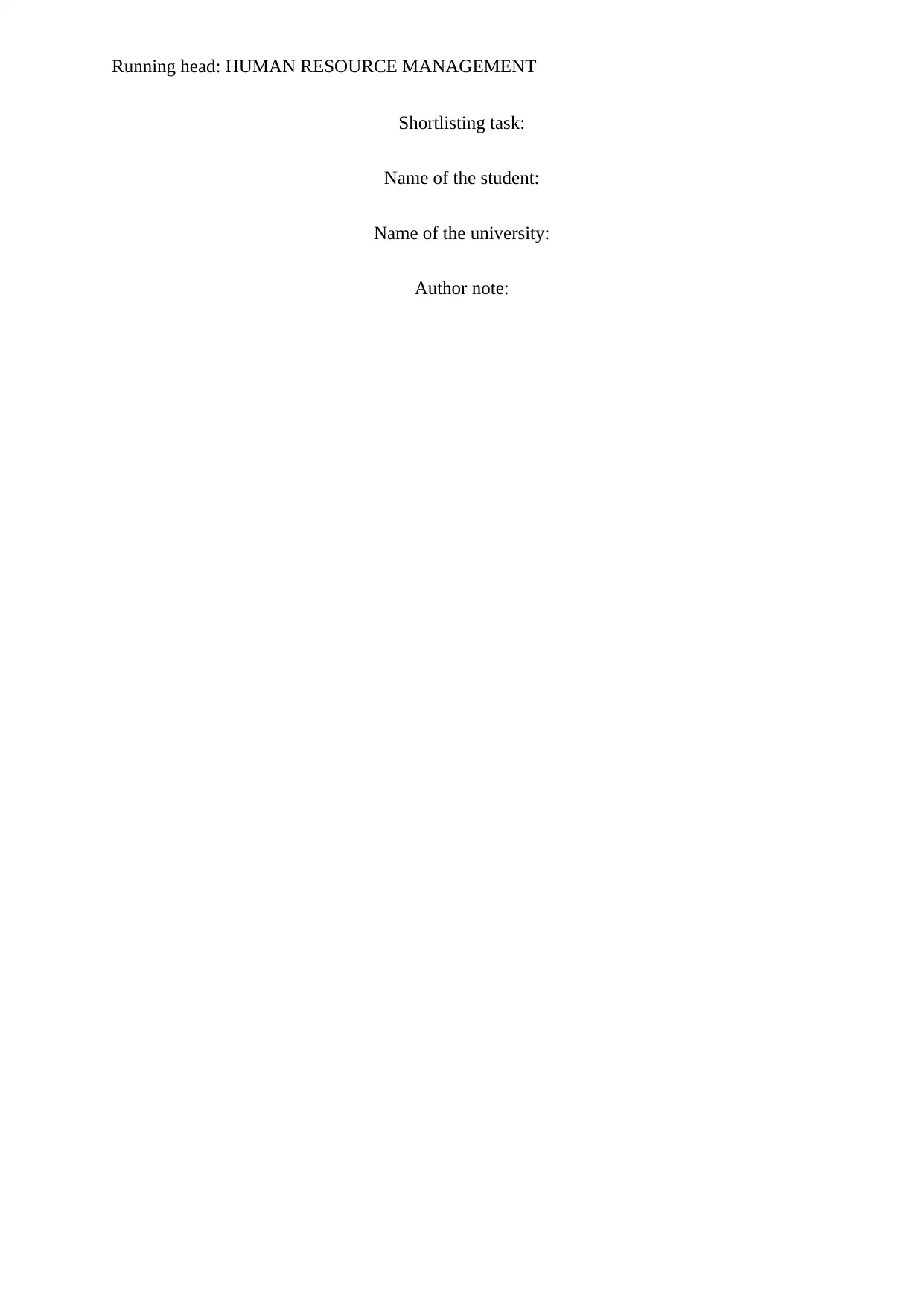
Running head: HUMAN RESOURCE MANAGEMENT
Shortlisting task:
Name of the student:
Name of the university:
Author note:
Shortlisting task:
Name of the student:
Name of the university:
Author note:
Paraphrase This Document
Need a fresh take? Get an instant paraphrase of this document with our AI Paraphraser
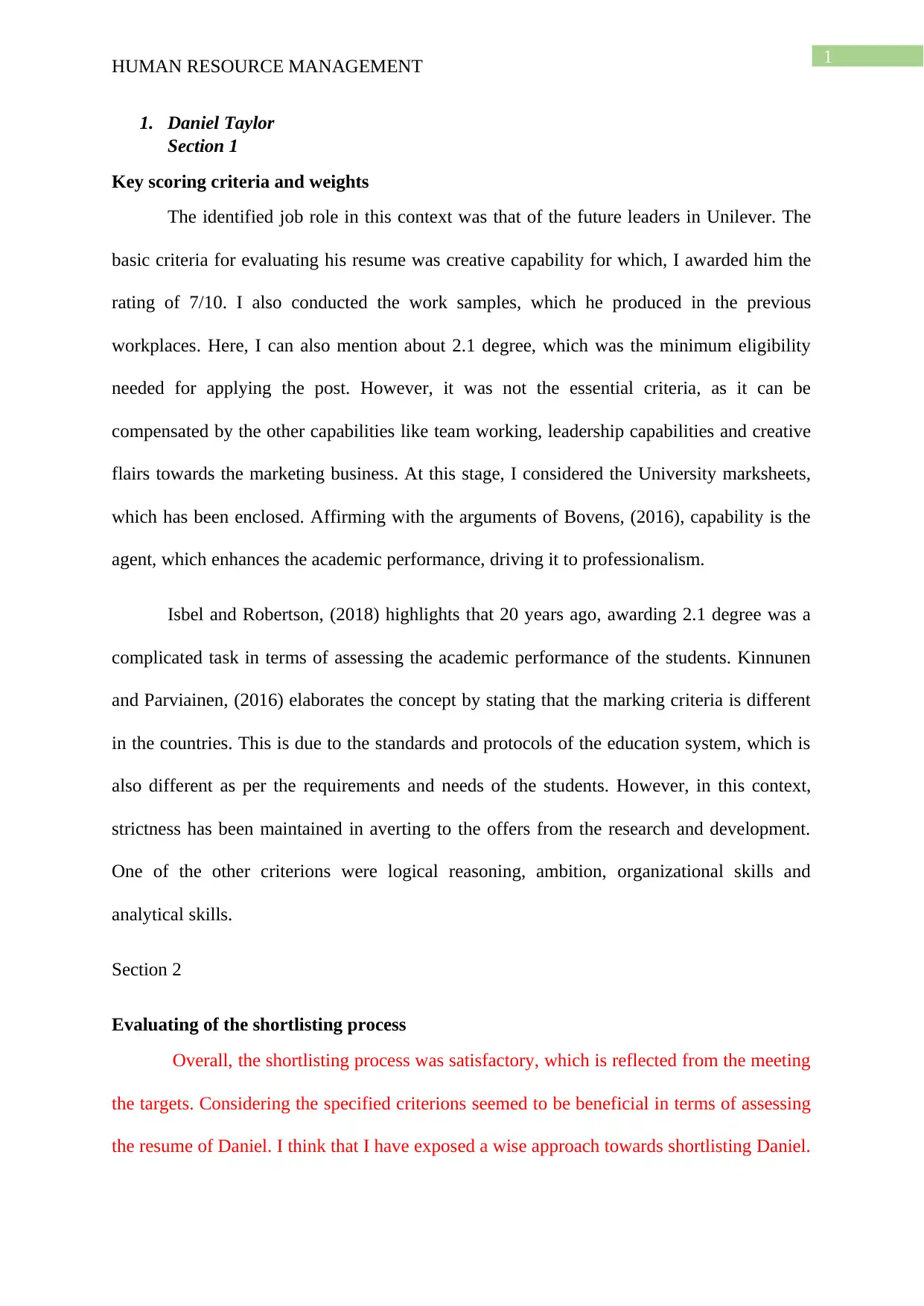
1
HUMAN RESOURCE MANAGEMENT
1. Daniel Taylor
Section 1
Key scoring criteria and weights
The identified job role in this context was that of the future leaders in Unilever. The
basic criteria for evaluating his resume was creative capability for which, I awarded him the
rating of 7/10. I also conducted the work samples, which he produced in the previous
workplaces. Here, I can also mention about 2.1 degree, which was the minimum eligibility
needed for applying the post. However, it was not the essential criteria, as it can be
compensated by the other capabilities like team working, leadership capabilities and creative
flairs towards the marketing business. At this stage, I considered the University marksheets,
which has been enclosed. Affirming with the arguments of Bovens, (2016), capability is the
agent, which enhances the academic performance, driving it to professionalism.
Isbel and Robertson, (2018) highlights that 20 years ago, awarding 2.1 degree was a
complicated task in terms of assessing the academic performance of the students. Kinnunen
and Parviainen, (2016) elaborates the concept by stating that the marking criteria is different
in the countries. This is due to the standards and protocols of the education system, which is
also different as per the requirements and needs of the students. However, in this context,
strictness has been maintained in averting to the offers from the research and development.
One of the other criterions were logical reasoning, ambition, organizational skills and
analytical skills.
Section 2
Evaluating of the shortlisting process
Overall, the shortlisting process was satisfactory, which is reflected from the meeting
the targets. Considering the specified criterions seemed to be beneficial in terms of assessing
the resume of Daniel. I think that I have exposed a wise approach towards shortlisting Daniel.
HUMAN RESOURCE MANAGEMENT
1. Daniel Taylor
Section 1
Key scoring criteria and weights
The identified job role in this context was that of the future leaders in Unilever. The
basic criteria for evaluating his resume was creative capability for which, I awarded him the
rating of 7/10. I also conducted the work samples, which he produced in the previous
workplaces. Here, I can also mention about 2.1 degree, which was the minimum eligibility
needed for applying the post. However, it was not the essential criteria, as it can be
compensated by the other capabilities like team working, leadership capabilities and creative
flairs towards the marketing business. At this stage, I considered the University marksheets,
which has been enclosed. Affirming with the arguments of Bovens, (2016), capability is the
agent, which enhances the academic performance, driving it to professionalism.
Isbel and Robertson, (2018) highlights that 20 years ago, awarding 2.1 degree was a
complicated task in terms of assessing the academic performance of the students. Kinnunen
and Parviainen, (2016) elaborates the concept by stating that the marking criteria is different
in the countries. This is due to the standards and protocols of the education system, which is
also different as per the requirements and needs of the students. However, in this context,
strictness has been maintained in averting to the offers from the research and development.
One of the other criterions were logical reasoning, ambition, organizational skills and
analytical skills.
Section 2
Evaluating of the shortlisting process
Overall, the shortlisting process was satisfactory, which is reflected from the meeting
the targets. Considering the specified criterions seemed to be beneficial in terms of assessing
the resume of Daniel. I think that I have exposed a wise approach towards shortlisting Daniel.
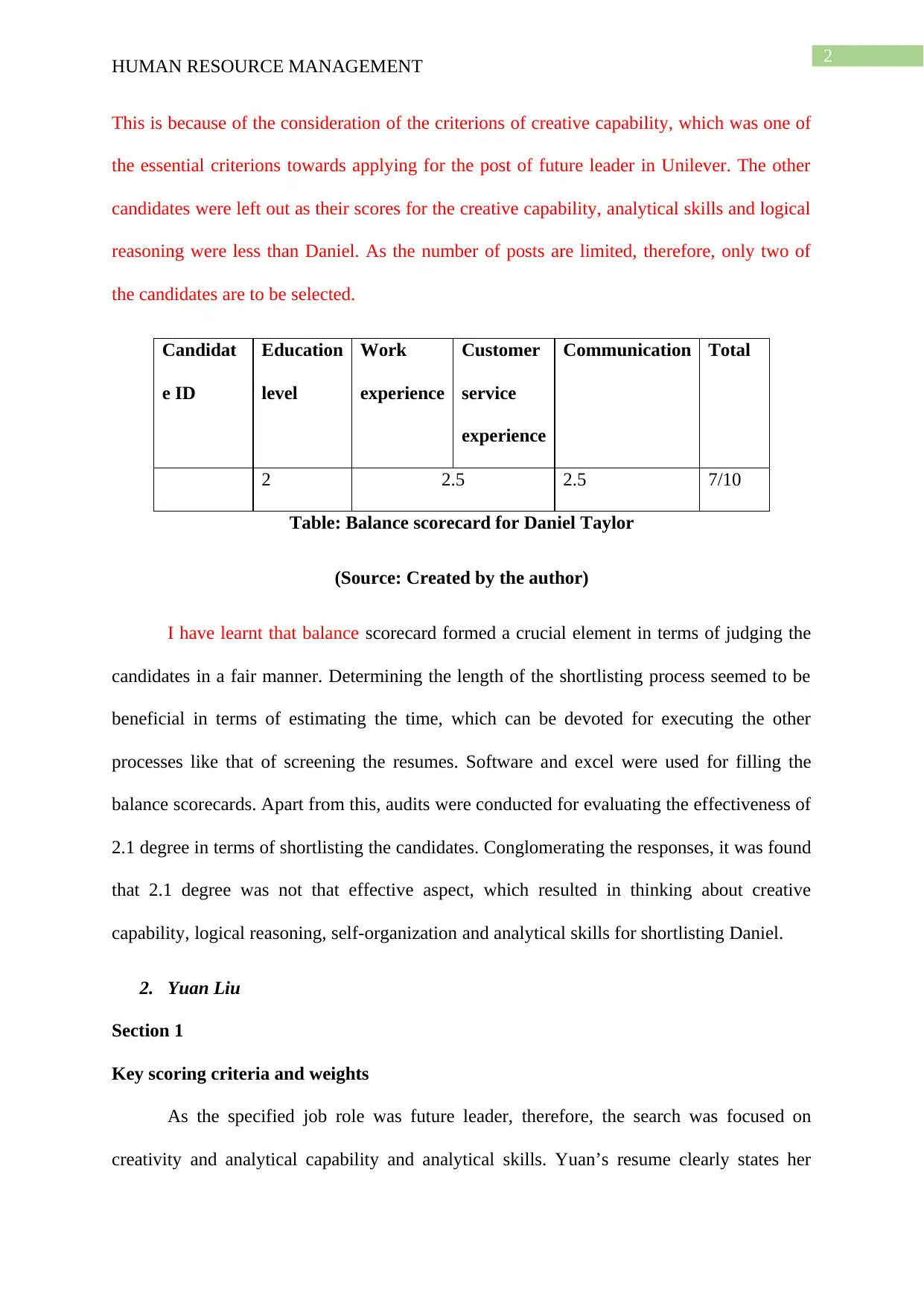
2
HUMAN RESOURCE MANAGEMENT
This is because of the consideration of the criterions of creative capability, which was one of
the essential criterions towards applying for the post of future leader in Unilever. The other
candidates were left out as their scores for the creative capability, analytical skills and logical
reasoning were less than Daniel. As the number of posts are limited, therefore, only two of
the candidates are to be selected.
Candidat
e ID
Education
level
Work
experience
Customer
service
experience
Communication Total
2 2.5 2.5 7/10
Table: Balance scorecard for Daniel Taylor
(Source: Created by the author)
I have learnt that balance scorecard formed a crucial element in terms of judging the
candidates in a fair manner. Determining the length of the shortlisting process seemed to be
beneficial in terms of estimating the time, which can be devoted for executing the other
processes like that of screening the resumes. Software and excel were used for filling the
balance scorecards. Apart from this, audits were conducted for evaluating the effectiveness of
2.1 degree in terms of shortlisting the candidates. Conglomerating the responses, it was found
that 2.1 degree was not that effective aspect, which resulted in thinking about creative
capability, logical reasoning, self-organization and analytical skills for shortlisting Daniel.
2. Yuan Liu
Section 1
Key scoring criteria and weights
As the specified job role was future leader, therefore, the search was focused on
creativity and analytical capability and analytical skills. Yuan’s resume clearly states her
HUMAN RESOURCE MANAGEMENT
This is because of the consideration of the criterions of creative capability, which was one of
the essential criterions towards applying for the post of future leader in Unilever. The other
candidates were left out as their scores for the creative capability, analytical skills and logical
reasoning were less than Daniel. As the number of posts are limited, therefore, only two of
the candidates are to be selected.
Candidat
e ID
Education
level
Work
experience
Customer
service
experience
Communication Total
2 2.5 2.5 7/10
Table: Balance scorecard for Daniel Taylor
(Source: Created by the author)
I have learnt that balance scorecard formed a crucial element in terms of judging the
candidates in a fair manner. Determining the length of the shortlisting process seemed to be
beneficial in terms of estimating the time, which can be devoted for executing the other
processes like that of screening the resumes. Software and excel were used for filling the
balance scorecards. Apart from this, audits were conducted for evaluating the effectiveness of
2.1 degree in terms of shortlisting the candidates. Conglomerating the responses, it was found
that 2.1 degree was not that effective aspect, which resulted in thinking about creative
capability, logical reasoning, self-organization and analytical skills for shortlisting Daniel.
2. Yuan Liu
Section 1
Key scoring criteria and weights
As the specified job role was future leader, therefore, the search was focused on
creativity and analytical capability and analytical skills. Yuan’s resume clearly states her
⊘ This is a preview!⊘
Do you want full access?
Subscribe today to unlock all pages.

Trusted by 1+ million students worldwide
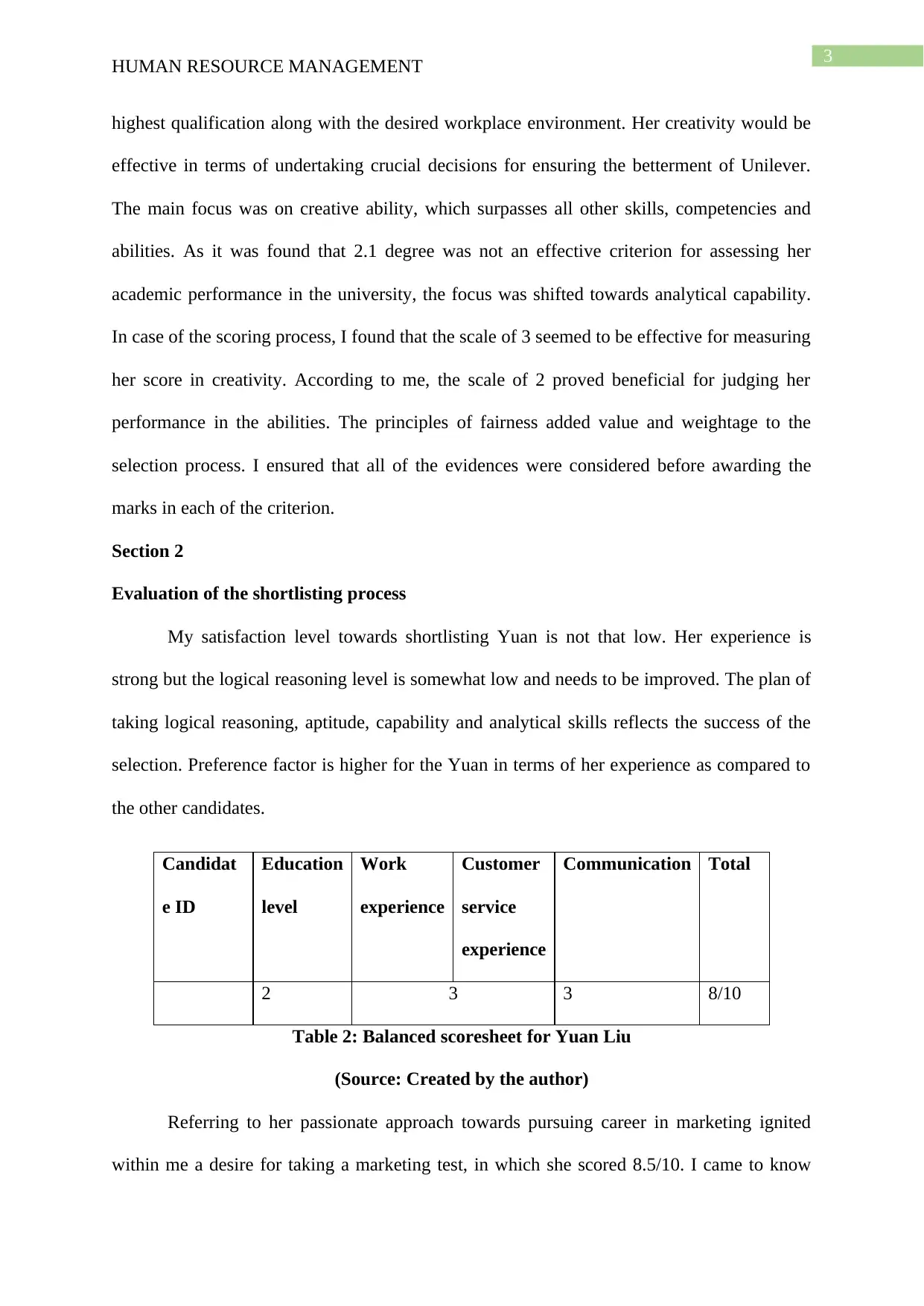
3
HUMAN RESOURCE MANAGEMENT
highest qualification along with the desired workplace environment. Her creativity would be
effective in terms of undertaking crucial decisions for ensuring the betterment of Unilever.
The main focus was on creative ability, which surpasses all other skills, competencies and
abilities. As it was found that 2.1 degree was not an effective criterion for assessing her
academic performance in the university, the focus was shifted towards analytical capability.
In case of the scoring process, I found that the scale of 3 seemed to be effective for measuring
her score in creativity. According to me, the scale of 2 proved beneficial for judging her
performance in the abilities. The principles of fairness added value and weightage to the
selection process. I ensured that all of the evidences were considered before awarding the
marks in each of the criterion.
Section 2
Evaluation of the shortlisting process
My satisfaction level towards shortlisting Yuan is not that low. Her experience is
strong but the logical reasoning level is somewhat low and needs to be improved. The plan of
taking logical reasoning, aptitude, capability and analytical skills reflects the success of the
selection. Preference factor is higher for the Yuan in terms of her experience as compared to
the other candidates.
Candidat
e ID
Education
level
Work
experience
Customer
service
experience
Communication Total
2 3 3 8/10
Table 2: Balanced scoresheet for Yuan Liu
(Source: Created by the author)
Referring to her passionate approach towards pursuing career in marketing ignited
within me a desire for taking a marketing test, in which she scored 8.5/10. I came to know
HUMAN RESOURCE MANAGEMENT
highest qualification along with the desired workplace environment. Her creativity would be
effective in terms of undertaking crucial decisions for ensuring the betterment of Unilever.
The main focus was on creative ability, which surpasses all other skills, competencies and
abilities. As it was found that 2.1 degree was not an effective criterion for assessing her
academic performance in the university, the focus was shifted towards analytical capability.
In case of the scoring process, I found that the scale of 3 seemed to be effective for measuring
her score in creativity. According to me, the scale of 2 proved beneficial for judging her
performance in the abilities. The principles of fairness added value and weightage to the
selection process. I ensured that all of the evidences were considered before awarding the
marks in each of the criterion.
Section 2
Evaluation of the shortlisting process
My satisfaction level towards shortlisting Yuan is not that low. Her experience is
strong but the logical reasoning level is somewhat low and needs to be improved. The plan of
taking logical reasoning, aptitude, capability and analytical skills reflects the success of the
selection. Preference factor is higher for the Yuan in terms of her experience as compared to
the other candidates.
Candidat
e ID
Education
level
Work
experience
Customer
service
experience
Communication Total
2 3 3 8/10
Table 2: Balanced scoresheet for Yuan Liu
(Source: Created by the author)
Referring to her passionate approach towards pursuing career in marketing ignited
within me a desire for taking a marketing test, in which she scored 8.5/10. I came to know
Paraphrase This Document
Need a fresh take? Get an instant paraphrase of this document with our AI Paraphraser
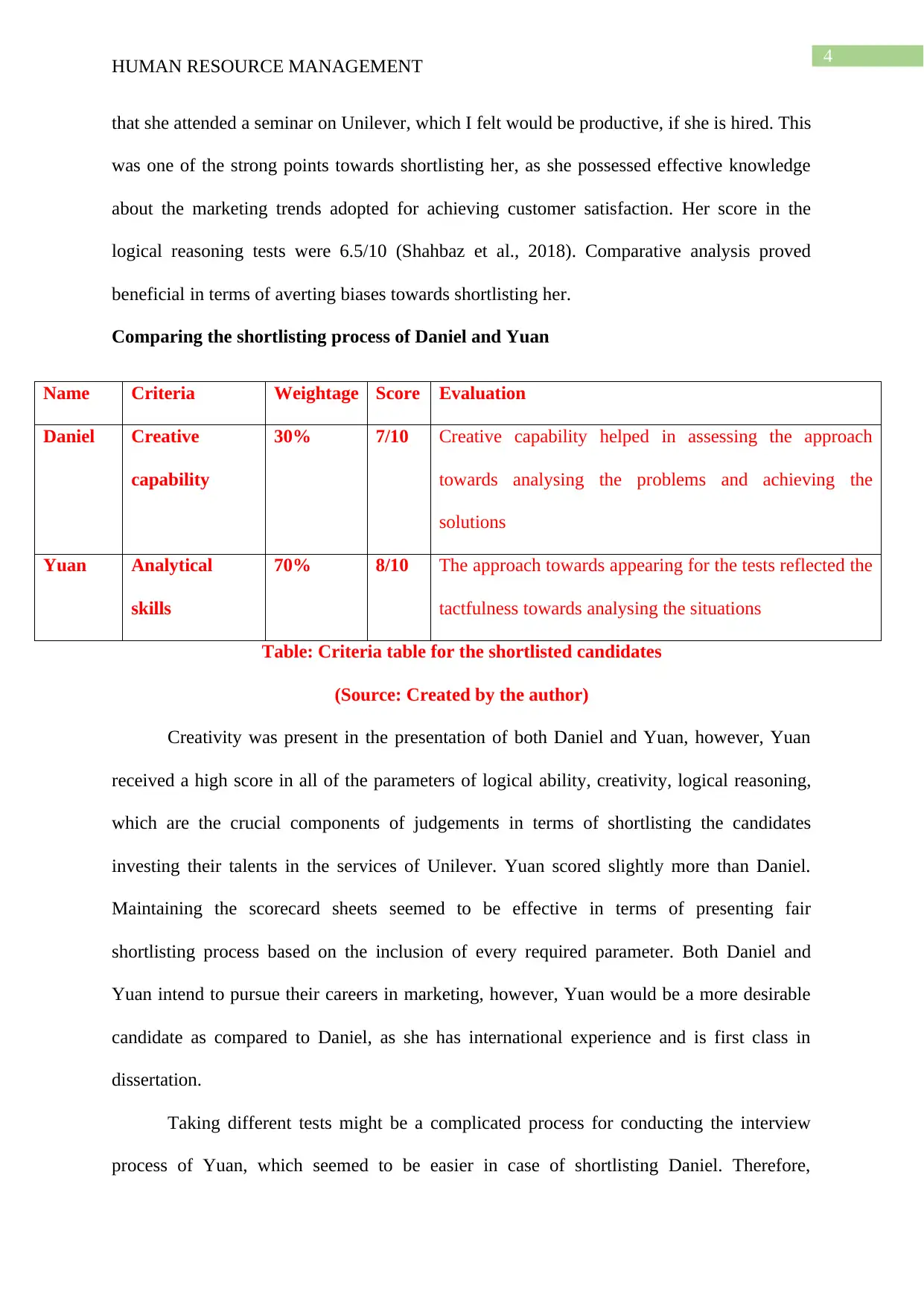
4
HUMAN RESOURCE MANAGEMENT
that she attended a seminar on Unilever, which I felt would be productive, if she is hired. This
was one of the strong points towards shortlisting her, as she possessed effective knowledge
about the marketing trends adopted for achieving customer satisfaction. Her score in the
logical reasoning tests were 6.5/10 (Shahbaz et al., 2018). Comparative analysis proved
beneficial in terms of averting biases towards shortlisting her.
Comparing the shortlisting process of Daniel and Yuan
Name Criteria Weightage Score Evaluation
Daniel Creative
capability
30% 7/10 Creative capability helped in assessing the approach
towards analysing the problems and achieving the
solutions
Yuan Analytical
skills
70% 8/10 The approach towards appearing for the tests reflected the
tactfulness towards analysing the situations
Table: Criteria table for the shortlisted candidates
(Source: Created by the author)
Creativity was present in the presentation of both Daniel and Yuan, however, Yuan
received a high score in all of the parameters of logical ability, creativity, logical reasoning,
which are the crucial components of judgements in terms of shortlisting the candidates
investing their talents in the services of Unilever. Yuan scored slightly more than Daniel.
Maintaining the scorecard sheets seemed to be effective in terms of presenting fair
shortlisting process based on the inclusion of every required parameter. Both Daniel and
Yuan intend to pursue their careers in marketing, however, Yuan would be a more desirable
candidate as compared to Daniel, as she has international experience and is first class in
dissertation.
Taking different tests might be a complicated process for conducting the interview
process of Yuan, which seemed to be easier in case of shortlisting Daniel. Therefore,
HUMAN RESOURCE MANAGEMENT
that she attended a seminar on Unilever, which I felt would be productive, if she is hired. This
was one of the strong points towards shortlisting her, as she possessed effective knowledge
about the marketing trends adopted for achieving customer satisfaction. Her score in the
logical reasoning tests were 6.5/10 (Shahbaz et al., 2018). Comparative analysis proved
beneficial in terms of averting biases towards shortlisting her.
Comparing the shortlisting process of Daniel and Yuan
Name Criteria Weightage Score Evaluation
Daniel Creative
capability
30% 7/10 Creative capability helped in assessing the approach
towards analysing the problems and achieving the
solutions
Yuan Analytical
skills
70% 8/10 The approach towards appearing for the tests reflected the
tactfulness towards analysing the situations
Table: Criteria table for the shortlisted candidates
(Source: Created by the author)
Creativity was present in the presentation of both Daniel and Yuan, however, Yuan
received a high score in all of the parameters of logical ability, creativity, logical reasoning,
which are the crucial components of judgements in terms of shortlisting the candidates
investing their talents in the services of Unilever. Yuan scored slightly more than Daniel.
Maintaining the scorecard sheets seemed to be effective in terms of presenting fair
shortlisting process based on the inclusion of every required parameter. Both Daniel and
Yuan intend to pursue their careers in marketing, however, Yuan would be a more desirable
candidate as compared to Daniel, as she has international experience and is first class in
dissertation.
Taking different tests might be a complicated process for conducting the interview
process of Yuan, which seemed to be easier in case of shortlisting Daniel. Therefore,
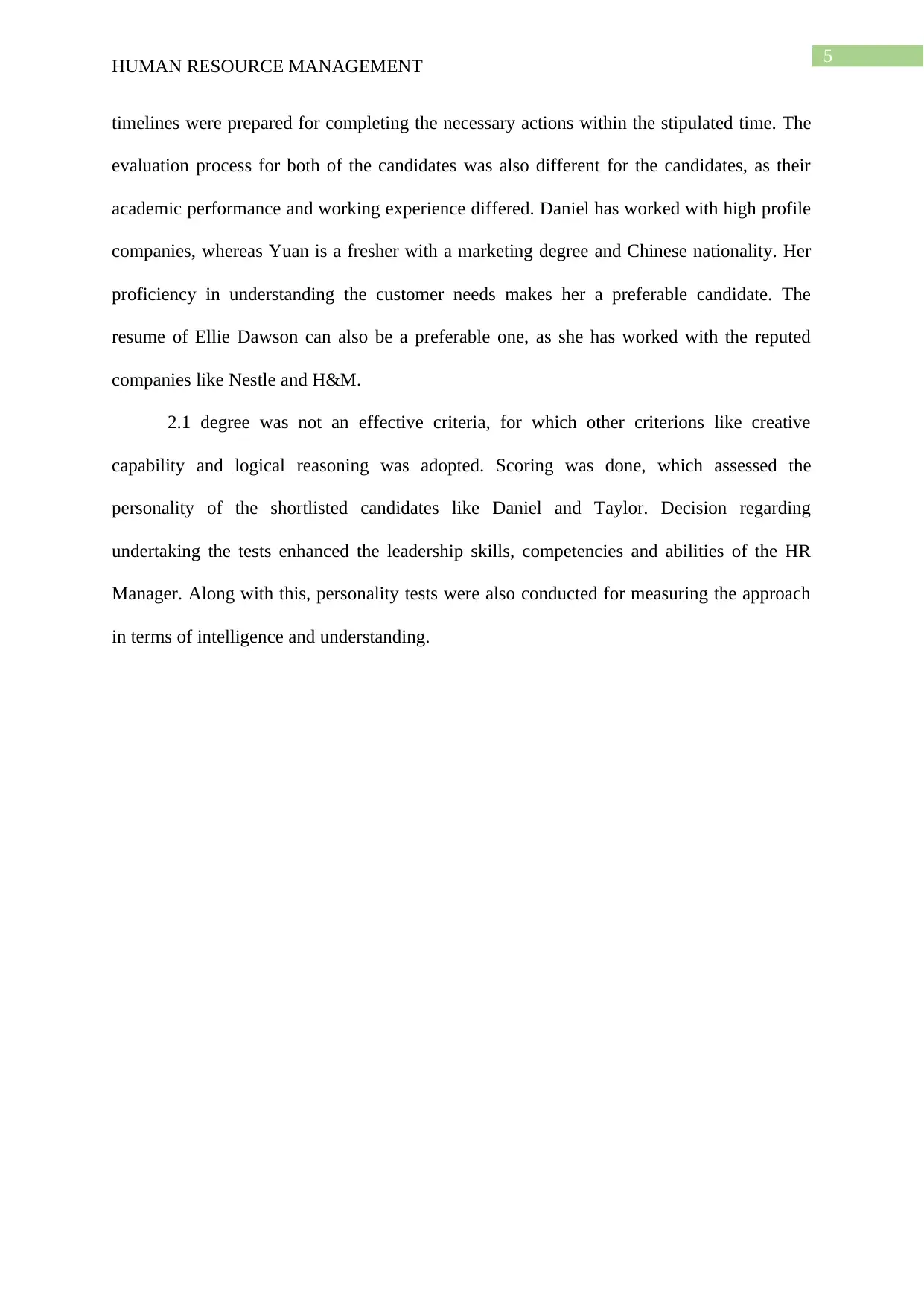
5
HUMAN RESOURCE MANAGEMENT
timelines were prepared for completing the necessary actions within the stipulated time. The
evaluation process for both of the candidates was also different for the candidates, as their
academic performance and working experience differed. Daniel has worked with high profile
companies, whereas Yuan is a fresher with a marketing degree and Chinese nationality. Her
proficiency in understanding the customer needs makes her a preferable candidate. The
resume of Ellie Dawson can also be a preferable one, as she has worked with the reputed
companies like Nestle and H&M.
2.1 degree was not an effective criteria, for which other criterions like creative
capability and logical reasoning was adopted. Scoring was done, which assessed the
personality of the shortlisted candidates like Daniel and Taylor. Decision regarding
undertaking the tests enhanced the leadership skills, competencies and abilities of the HR
Manager. Along with this, personality tests were also conducted for measuring the approach
in terms of intelligence and understanding.
HUMAN RESOURCE MANAGEMENT
timelines were prepared for completing the necessary actions within the stipulated time. The
evaluation process for both of the candidates was also different for the candidates, as their
academic performance and working experience differed. Daniel has worked with high profile
companies, whereas Yuan is a fresher with a marketing degree and Chinese nationality. Her
proficiency in understanding the customer needs makes her a preferable candidate. The
resume of Ellie Dawson can also be a preferable one, as she has worked with the reputed
companies like Nestle and H&M.
2.1 degree was not an effective criteria, for which other criterions like creative
capability and logical reasoning was adopted. Scoring was done, which assessed the
personality of the shortlisted candidates like Daniel and Taylor. Decision regarding
undertaking the tests enhanced the leadership skills, competencies and abilities of the HR
Manager. Along with this, personality tests were also conducted for measuring the approach
in terms of intelligence and understanding.
⊘ This is a preview!⊘
Do you want full access?
Subscribe today to unlock all pages.

Trusted by 1+ million students worldwide
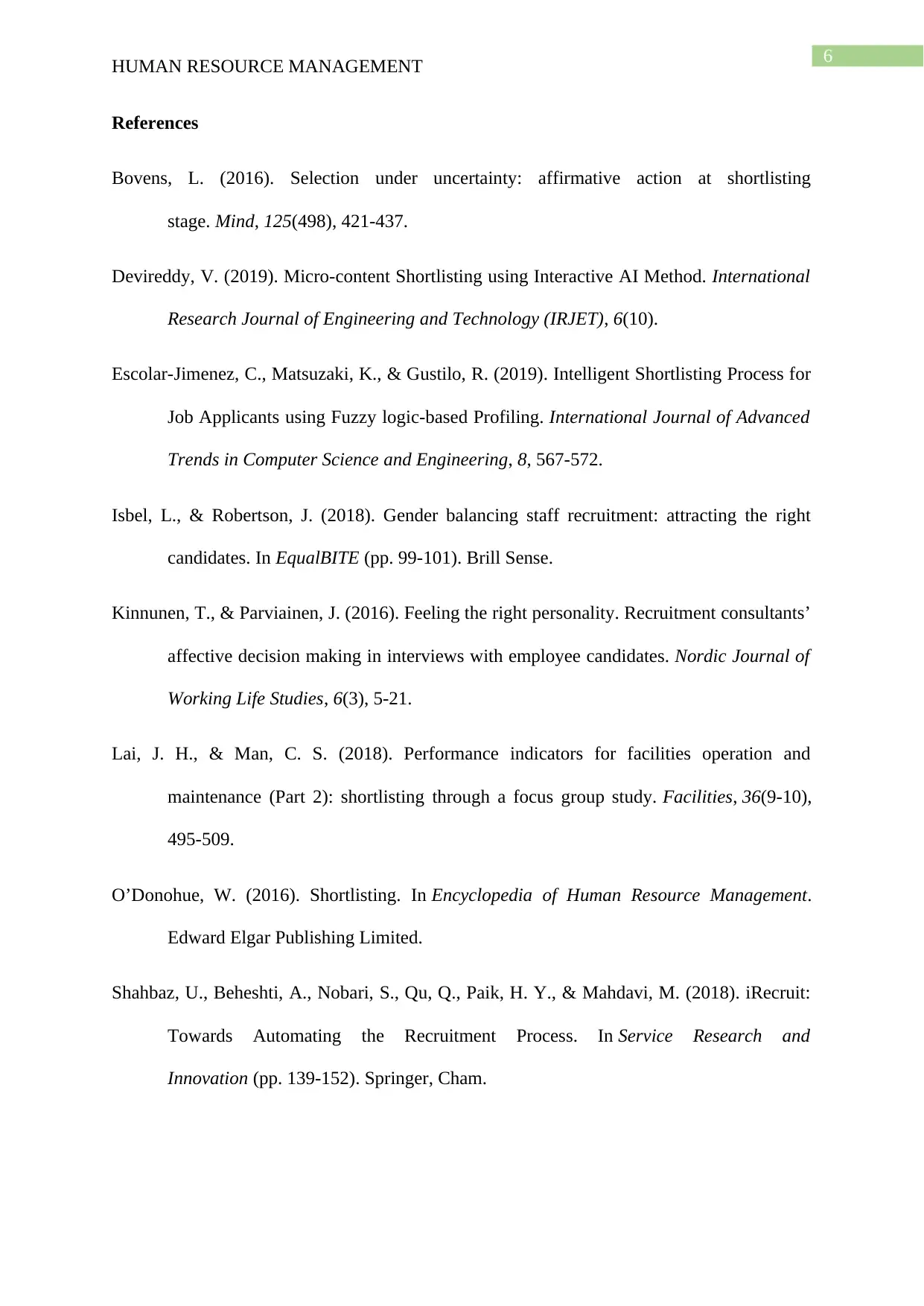
6
HUMAN RESOURCE MANAGEMENT
References
Bovens, L. (2016). Selection under uncertainty: affirmative action at shortlisting
stage. Mind, 125(498), 421-437.
Devireddy, V. (2019). Micro-content Shortlisting using Interactive AI Method. International
Research Journal of Engineering and Technology (IRJET), 6(10).
Escolar-Jimenez, C., Matsuzaki, K., & Gustilo, R. (2019). Intelligent Shortlisting Process for
Job Applicants using Fuzzy logic-based Profiling. International Journal of Advanced
Trends in Computer Science and Engineering, 8, 567-572.
Isbel, L., & Robertson, J. (2018). Gender balancing staff recruitment: attracting the right
candidates. In EqualBITE (pp. 99-101). Brill Sense.
Kinnunen, T., & Parviainen, J. (2016). Feeling the right personality. Recruitment consultants’
affective decision making in interviews with employee candidates. Nordic Journal of
Working Life Studies, 6(3), 5-21.
Lai, J. H., & Man, C. S. (2018). Performance indicators for facilities operation and
maintenance (Part 2): shortlisting through a focus group study. Facilities, 36(9-10),
495-509.
O’Donohue, W. (2016). Shortlisting. In Encyclopedia of Human Resource Management.
Edward Elgar Publishing Limited.
Shahbaz, U., Beheshti, A., Nobari, S., Qu, Q., Paik, H. Y., & Mahdavi, M. (2018). iRecruit:
Towards Automating the Recruitment Process. In Service Research and
Innovation (pp. 139-152). Springer, Cham.
HUMAN RESOURCE MANAGEMENT
References
Bovens, L. (2016). Selection under uncertainty: affirmative action at shortlisting
stage. Mind, 125(498), 421-437.
Devireddy, V. (2019). Micro-content Shortlisting using Interactive AI Method. International
Research Journal of Engineering and Technology (IRJET), 6(10).
Escolar-Jimenez, C., Matsuzaki, K., & Gustilo, R. (2019). Intelligent Shortlisting Process for
Job Applicants using Fuzzy logic-based Profiling. International Journal of Advanced
Trends in Computer Science and Engineering, 8, 567-572.
Isbel, L., & Robertson, J. (2018). Gender balancing staff recruitment: attracting the right
candidates. In EqualBITE (pp. 99-101). Brill Sense.
Kinnunen, T., & Parviainen, J. (2016). Feeling the right personality. Recruitment consultants’
affective decision making in interviews with employee candidates. Nordic Journal of
Working Life Studies, 6(3), 5-21.
Lai, J. H., & Man, C. S. (2018). Performance indicators for facilities operation and
maintenance (Part 2): shortlisting through a focus group study. Facilities, 36(9-10),
495-509.
O’Donohue, W. (2016). Shortlisting. In Encyclopedia of Human Resource Management.
Edward Elgar Publishing Limited.
Shahbaz, U., Beheshti, A., Nobari, S., Qu, Q., Paik, H. Y., & Mahdavi, M. (2018). iRecruit:
Towards Automating the Recruitment Process. In Service Research and
Innovation (pp. 139-152). Springer, Cham.
1 out of 7
Your All-in-One AI-Powered Toolkit for Academic Success.
+13062052269
info@desklib.com
Available 24*7 on WhatsApp / Email
![[object Object]](/_next/static/media/star-bottom.7253800d.svg)
Unlock your academic potential
Copyright © 2020–2026 A2Z Services. All Rights Reserved. Developed and managed by ZUCOL.
